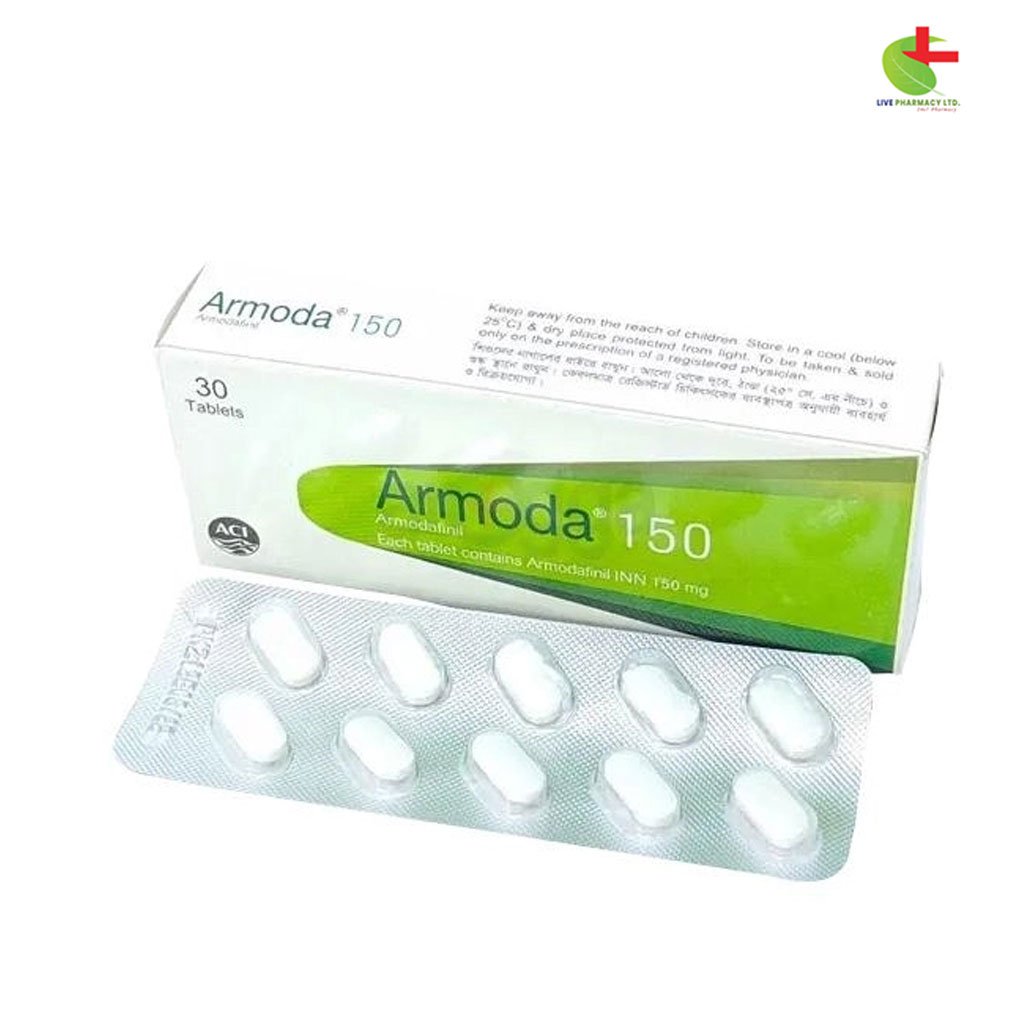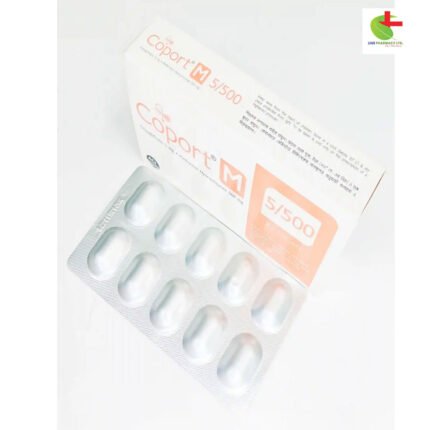Armoda
150.00৳ Strip(10)
- Armoda is a CNS stimulant used to improve wakefulness in adults with Obstructive Sleep Apnea (OSA), Narcolepsy, and Shift Work Disorder (SWD).
- It works by increasing dopamine activity in the brain, promoting alertness and reducing excessive sleepiness.
- Available in doses of 150-250 mg, it should be taken as directed by a healthcare professional.
- Caution is advised in patients with psychiatric or cardiovascular conditions, and dosage adjustments may be needed in those with hepatic or renal impairment.
 Brand
Brand
|
ACI Limited |
|---|---|
 Generics
Generics
|
Armodafinil |
 Type
Type
|
Tablet |
Indications
Armoda is prescribed to help adults stay awake and alert in the following conditions:
- Obstructive Sleep Apnea (OSA)
- Narcolepsy
- Shift Work Disorder (SWD)
Always follow the advice of a registered healthcare professional before taking this medication.
Pharmacology
Armodafinil is a selective dopamine receptor agonist and the active R-enantiomer of Modafinil. Unlike Modafinil, which contains both the R- and S-enantiomers in equal proportions, Armodafinil solely consists of the R-enantiomer. It works by binding to dopamine transporters, inhibiting the reuptake of dopamine. This action increases neuronal activity in the hypothalamus, particularly in the wakefulness center (TMN, tuberomammillary nucleus), which helps to promote wakefulness.
Dosage & Administration
- Adults:
- Obstructive Sleep Apnea & Narcolepsy: A single dose of 150-250 mg in the morning.
- Shift Work Disorder: 150 mg taken 1 hour before the start of the work shift.
- Children: The safety and effectiveness of Armoda in patients under 17 years of age have not been established.
- Elderly: In older adults, Armoda’s clearance may be reduced due to age-related changes in metabolism. Therefore, lower doses and careful monitoring are recommended.
Always follow the advice of a registered healthcare professional before taking this medication.
Drug Interactions
- Armoda may increase the clearance of drugs metabolized by CYP3A4 or CYP3A5 (e.g., steroid contraceptives, Cyclosporine, Midazolam), resulting in lower systemic exposure. Dosage adjustments of these medications may be necessary.
- Armoda can prolong the elimination of drugs metabolized by CYP2C19 (e.g., Phenytoin, Diazepam, Omeprazole), leading to higher exposure. Adjustments in dosage may be needed when used together.
- Close monitoring of prothrombin times/INR is recommended when Armoda is used with Warfarin.
- Exercise caution when combining Armoda with MAO inhibitors.
Contraindications
Armoda should not be used by individuals who have a known hypersensitivity to Armodafinil or any of the components in the formulation.
Side Effects
Common side effects of Armoda may include serious rashes (e.g., Stevens-Johnson syndrome), angioedema, anaphylaxis, multi-organ hypersensitivity reactions, persistent sleepiness, psychiatric symptoms, and some cardiovascular issues.
Pregnancy & Lactation
There are no well-controlled studies on Armodafinil use during pregnancy. It should only be used during pregnancy if the potential benefits outweigh the risks. It is unclear whether Armodafinil is excreted in breast milk. Given that many medications pass into breast milk, caution should be exercised when administering Armodafinil to nursing mothers.
Precautions & Warnings
Patients should avoid operating machinery or driving until it is certain that Armoda does not impair their ability to do so. Caution is advised when treating individuals with a history of psychiatric disorders, such as psychosis, depression, or mania. If psychiatric symptoms arise, discontinuation of the medication should be considered. Regular monitoring of heart rate and blood pressure is recommended. Extra care should be taken when prescribing Armoda to individuals with cardiovascular conditions.
Use in Special Populations
- Hepatic Impairment: In patients with severe liver dysfunction, Armoda should be administered at a reduced dose.
- Renal Impairment: There is limited data available on the safety and efficacy of Armoda in patients with severe renal impairment.
Overdose Effects
No overdose cases have been reported in clinical trials of Armoda. Symptoms of overdose are expected to resemble those of Modafinil and may include agitation, insomnia, and slight to moderate changes in vital signs. There is no specific antidote for Armoda overdose. Management should involve supportive care.
Therapeutic Class
CNS Stimulants
Storage Conditions
Store Armoda below 25°C, away from light and moisture. Keep out of reach of children.













Reviews
There are no reviews yet.